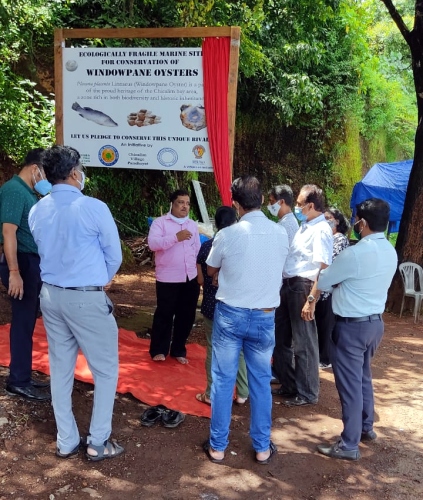
VASCO
The Chicalim Biodiversity Management Committee (BMC) recently unveiled four education and awareness boards along the NH17A between Chicalim and Sancoale, to highlight the ecological importance of the Chicalim Bay.
The boards were inaugurated by Dr Pradip Sarmokadam, Member Secretary of Goa State Biodiversity Board in the presence of Prof. Sunil Bhand, Prof. Sumit Biswas, Rev Dr Bolmax Pereira, Asst Professor of Botany, St Joseph Vaz College, Cortalim and members of the Chicalim BMC.
The Chicalim Bay between Chicalim and Sancoale along the Zuari estuary is considered an ecologically fragile marine zone. The sediments of this Bay are a rich breeding ground for a variety of shellfish and other finfish for ages and offers sustainable livelihood options to the marginalised section of this locality.
The Windowpane Oyster (Placuna Placenta), locally known as 'Mendios', also breeds under natural conditions and is a Scheduled IV species under the Wildlife Protection Act.
Chicalim BMC Chairman Rui M Costa Araújo and members, Kapil D Naik, Marie Mascarenhas, Robert dos Reis Falcao, Sushma Narvekar and Mary D'Costa expressed gratitude to The Wildlife Trust of India for sponsoring the awareness & educational boards.
They also thanked Dr G Raghurama (Director), Dr Sunil Bhand (Dean) and Prof. Sumit Biswas of BITS Pilani (Goa), the Goa State Biodiversity Board, Chicalim Sarpanch Sebastiao Pereira, then Sancoale Sarpanch Ramakant Borkar, Executive Engineer Dattaprasad Kamat and students of Don Bosco College of Agriculture, Sulcorna for coordinating and assisting in the project.